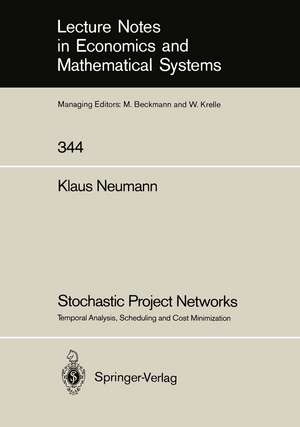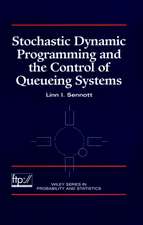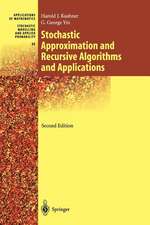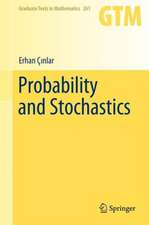Stochastic Project Networks: Temporal Analysis, Scheduling and Cost Minimization: Lecture Notes in Economics and Mathematical Systems, cartea 344
Autor Klaus Neumannen Limba Engleză Paperback – 10 iul 1990
Din seria Lecture Notes in Economics and Mathematical Systems
-
 Preț: 360.02 lei
Preț: 360.02 lei -
 Preț: 383.93 lei
Preț: 383.93 lei - 15%
 Preț: 693.39 lei
Preț: 693.39 lei -
 Preț: 384.09 lei
Preț: 384.09 lei -
 Preț: 380.07 lei
Preț: 380.07 lei -
 Preț: 446.26 lei
Preț: 446.26 lei -
 Preț: 497.37 lei
Preț: 497.37 lei -
 Preț: 380.84 lei
Preț: 380.84 lei -
 Preț: 384.86 lei
Preț: 384.86 lei -
 Preț: 378.34 lei
Preț: 378.34 lei -
 Preț: 399.67 lei
Preț: 399.67 lei - 20%
 Preț: 360.93 lei
Preț: 360.93 lei - 15%
 Preț: 643.16 lei
Preț: 643.16 lei -
 Preț: 379.09 lei
Preț: 379.09 lei -
 Preț: 404.76 lei
Preț: 404.76 lei -
 Preț: 385.62 lei
Preț: 385.62 lei - 15%
 Preț: 644.49 lei
Preț: 644.49 lei -
 Preț: 379.09 lei
Preț: 379.09 lei -
 Preț: 345.50 lei
Preț: 345.50 lei -
 Preț: 425.80 lei
Preț: 425.80 lei -
 Preț: 378.34 lei
Preț: 378.34 lei - 18%
 Preț: 775.65 lei
Preț: 775.65 lei -
 Preț: 392.60 lei
Preț: 392.60 lei -
 Preț: 401.61 lei
Preț: 401.61 lei - 15%
 Preț: 646.43 lei
Preț: 646.43 lei -
 Preț: 382.18 lei
Preț: 382.18 lei -
 Preț: 378.34 lei
Preț: 378.34 lei - 15%
 Preț: 637.59 lei
Preț: 637.59 lei - 15%
 Preț: 647.27 lei
Preț: 647.27 lei -
 Preț: 377.73 lei
Preț: 377.73 lei -
 Preț: 447.84 lei
Preț: 447.84 lei - 15%
 Preț: 644.49 lei
Preț: 644.49 lei -
 Preț: 386.00 lei
Preț: 386.00 lei - 15%
 Preț: 654.43 lei
Preț: 654.43 lei -
 Preț: 415.02 lei
Preț: 415.02 lei -
 Preț: 411.54 lei
Preț: 411.54 lei -
 Preț: 398.92 lei
Preț: 398.92 lei -
 Preț: 398.92 lei
Preț: 398.92 lei -
 Preț: 392.75 lei
Preț: 392.75 lei - 15%
 Preț: 635.47 lei
Preț: 635.47 lei - 20%
 Preț: 653.56 lei
Preț: 653.56 lei -
 Preț: 379.86 lei
Preț: 379.86 lei -
 Preț: 495.46 lei
Preț: 495.46 lei -
 Preț: 447.99 lei
Preț: 447.99 lei -
 Preț: 378.71 lei
Preț: 378.71 lei - 15%
 Preț: 637.13 lei
Preț: 637.13 lei -
 Preț: 385.84 lei
Preț: 385.84 lei -
 Preț: 378.54 lei
Preț: 378.54 lei - 15%
 Preț: 666.55 lei
Preț: 666.55 lei
Preț: 386.00 lei
Nou
Puncte Express: 579
Preț estimativ în valută:
73.87€ • 80.21$ • 62.05£
73.87€ • 80.21$ • 62.05£
Carte tipărită la comandă
Livrare economică 22 aprilie-06 mai
Preluare comenzi: 021 569.72.76
Specificații
ISBN-13: 9783540526643
ISBN-10: 3540526641
Pagini: 260
Ilustrații: XI, 237 p.
Dimensiuni: 170 x 242 x 14 mm
Greutate: 0.37 kg
Ediția:1990
Editura: Springer Berlin, Heidelberg
Colecția Springer
Seria Lecture Notes in Economics and Mathematical Systems
Locul publicării:Berlin, Heidelberg, Germany
ISBN-10: 3540526641
Pagini: 260
Ilustrații: XI, 237 p.
Dimensiuni: 170 x 242 x 14 mm
Greutate: 0.37 kg
Ediția:1990
Editura: Springer Berlin, Heidelberg
Colecția Springer
Seria Lecture Notes in Economics and Mathematical Systems
Locul publicării:Berlin, Heidelberg, Germany
Public țintă
ResearchCuprins
1 Basic Concepts.- 1.1 Directed Graphs and Project Networks.- 1.2 GERT Networks.- 1.3 Assumptions and Structural Problems.- 1.4 Complete and GERT Subnetworks.- 2 Temporal Analysis of GERT Networks.- 2.1 Activation Functions and Activation Distributions.- 2.2 Evaluation of Admissible GERT Networks.- 2.3 Computation of Some Quantities Important to Time Planning.- 2.4 Evaluation Methods for Admissible GERT Networks.- 3 STEOR Networks and EOR Networks.- 3.1 Markov Chains and Markov Renewal Processes.- 3.2 STEOR Networks and Markov Renewal Processes.- 3.3 Basic Properties of Admissible EOR Networks.- 3.4 Coverings of Admissible EOR Networks.- 3.5 Properties and Computation of Activation Functions and Activation Numbers.- 3.6 The MRP Method.- 4 Reducible GERT Networks.- 4.1 STEOR—Reducible Subnetworks.- 4.2 Cycle Reduction.- 4.3 Nodes Which Belong Together.- 4.4 Basic Element Structures.- 4.5 BES Networks.- 4.6 Evaluation Methods for BES Networks and General Admissible GERT Networks.- 5 Scheduling with GERT Precedence Constraints.- 5.1 Deterministic Single—Machine Scheduling.- 5.2 Stochastic Single—Machine Scheduling with GERT Precedence Constraints: Basic Concepts.- 5.3 Stochastic Single—Machine Scheduling with GERT Precedence Constraints: Optimality Criteria and Complexity.- 5.4 List Schedules and Sequences of Activity Executions.- 5.5 Minimum Flow—Time Scheduling in FOR Networks.- 5.6 A Flow—Time Scheduling Example.- 5.7 Minimizing the Maximum Expected Lateness in FOR Networks.- 5.8 Essential Histories and Scheduling Policies for Min—Sum Problems in General GERT Networks.- 5.9 Elements of Dynamic Programming.- 5.10 Determination of an Optimal Scheduling Policy for the General Min—Sum Problem.- 6 Cost Minimization for STEOR and FOR Networks.- 6.1 STEORNetworks with Time—Dependent Arc Weights.- 6.2 Cost Minimization in STEOR Networks: Basic Concepts.- 6.3 A Dynamic Programming Approach.- 6.4 The Value—Iteration and Policy—Iteration Techniques.- 7 Cost and Time Minimization for Decision Project Networks.- 7.1 Decision Project Networks.- 7.2 Cost Minimization.- 7.3 Randomized Actions.- 7.4 Multiple Executions of Projects.- 7.5 Time Minimization.- References.















